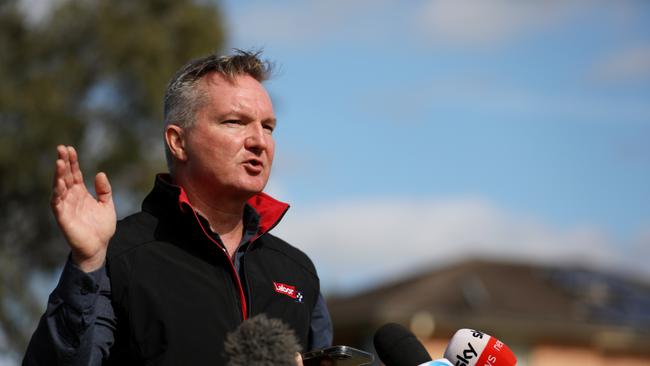Election 2025: Labor household batteries plan ‘a budget bomb’: Coalition
Labor dismissed the opposition’s calculations as ‘completely wrong’, while energy experts are divided on the plan to subsidise household batteries.

Leading energy experts are divided on Labor’s proposal to subsidise household batteries, as the Coalition claimed the ALP was “cooking the books” and Labor dismissed the Coalition’s “completely wrong” calculations.
Anthony Albanese on Sunday unveiled a $2.3bn pledge to subsidise part of the cost of a household battery for people with rooftop solar, “reducing the cost of a typical installed battery by 30 per cent” and reducing that household’s reliance on the grid.
“This is good for power bills and good for the environment,” the Prime Minister said. “Only Labor has a plan to build Australia’s future.”
Peter Dutton lashed the policy, saying it was “confirmation that electricity prices are certain to go up” under a re-elected Albanese government. “The point I’d make is that for $10,000 for a battery, maybe that’s the cost after this subsidy – I think you’re talking about higher-income families being in a position to pay for that,” the Opposition Leader said.
MST Marquee senior energy analyst Saul Kavonic blasted the proposal as a mechanism that would make taxpayer dollars go to subsidise wealthy, high-energy users. “It’s only those people who can afford or are near to affording battery systems … who are going to benefit from this,” he said.
“The second thing is it’s fundamentally a mechanism for taxpayers to subsidise energy users, and so after we’ve had years of failed energy policy, which has seen prices rise, we’re now seeing the government go down the inevitable path of pushing that cost on to taxpayers.”
Mr Kavonic said “after many other examples”, it was another case where “Labor has gone down a path of going for what is going to be populist and satisfying the green elements of the party rather than what’s going to result in a lower system cost and pricing for everybody”.
He said the longer-term ramification of such a policy would mean that as larger shares of wealthy Australians shifted over to be less reliant on the grid, the remaining majority would be “burdened with higher unit network costs”.

Victorian Energy Policy Centre director Bruce Mountain backed the “sensible” policy, however, saying it could multiply the battery storage capacity currently in the east coast grid, despite the subsidy most likely benefiting wealthy households.
“Just like there was for rooftop solar, there’ll still be a substantial element of homeowners dipping into their back pocket to bring this on,” Professor Mountain said.
“And in the same way that rooftop solar has brought benefit for all consumers by introducing cheap electricity in the middle of the day, which everyone can share in, by shifting surpluses of production from the middle of the day into the evening, they’ll drive out much more expensive peaking generation.
“I really think the Coalition should be seeking to either copy this or better it. That’s undoubtedly where the interests of all customers lie, not just individual households.”
Separately, opposition energy spokesman Ted O’Brien claimed “dodgy figures” on Labor’s $2.3bn announcement.
The Coalition questioned the figure, given Labor said the program would save around $4000 on a typical battery and that “over one million new batteries (were) expected by 2030”; those two figures multiply to be $4bn.
The Coalition also suggested that rooftop solar take-up was so prolific that if every new household installation to 2030 were to take up the battery storage option, this would take the possible costs to more than $25bn.
“Labor has a long history of cooking the books – and now they’re at it again with the battery budget bomb,” Mr O’Brien said.
“This is the same government that dumped its own energy market modelling because it didn’t suit their spin. Now they want Australians to trust their battery numbers? Forget it.”
Energy Minister Chris Bowen’s office said the Coalition calculation was “completely wrong” and called it “another desperate attempt to distract from Peter Dutton’s $600bn nuclear plan”.
“Unlike their crumbling nuclear plan, our Cheaper Home Batteries policy was costed by the Treasury and Department of Finance before the caretaker period and is accounted for in the budget,” a spokeswoman said.
The government said the subsidy program would taper over five years and would be assessed every year to make sure the program was working as intended.





To join the conversation, please log in. Don't have an account? Register
Join the conversation, you are commenting as Logout